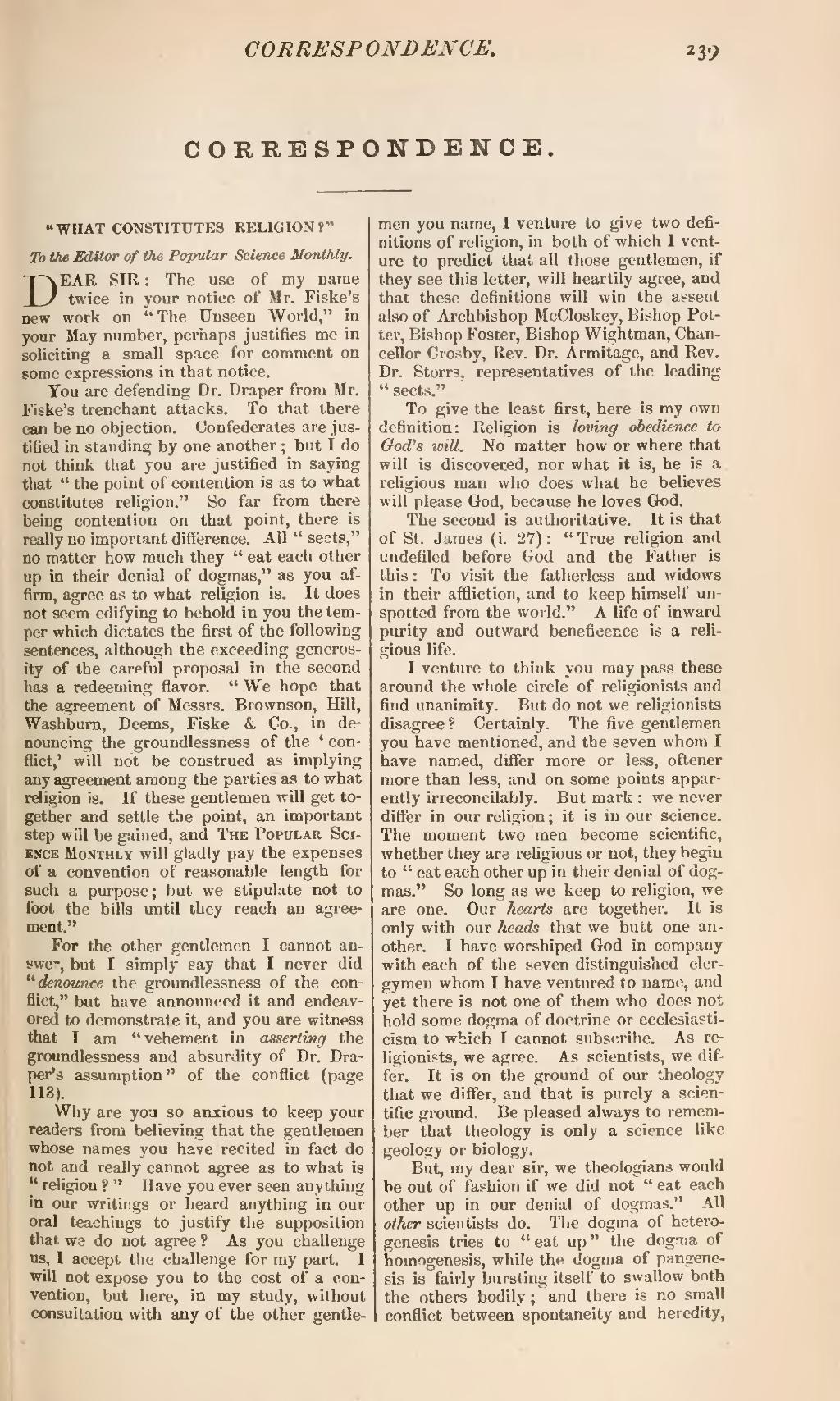"WHAT CONSTITUTES RELIGION?"
To the Editor of the Popular Science Monthly.
DEAR SIR: The use of my name twice in your notice of Mr. Fiske's new work on "The Unseen World," in your May number, perhaps justifies me in soliciting a small space for comment on some expressions in that notice.
You are defending Dr. Draper from Mr. Fiske's trenchant attacks. To that there can be no objection. Confederates are justified in standing by one another; but I do not think that you are justified in saying that "the point of contention is as to what constitutes religion." So far from there being contention on that point, there is really no important difference. All "sects," no matter how much they "eat each other up in their denial of dogmas," as you affirm, agree as to what religion is. It does not seem edifying to behold in you the temper which dictates the first of the following sentences, although the exceeding generosity of the careful proposal in the second has a redeeming flavor. "We hope that the agreement of Messrs. Brownson, Hill, Washburn, Deems, Fiske & Co., in denouncing the groundlessness of the 'conflict,' will not be construed as implying any agreement among the parties as to what religion is. If these gentlemen will get together and settle the point, an important step will be gained, and The Popular Science Monthly will gladly pay the expenses of a convention of reasonable length for such a purpose; but we stipulate not to foot the bills until they reach an agreement."
For the other gentlemen I cannot answer, but I simply say that I never did "denounce the groundlessness of the conflict," but have announced it and endeavored to demonstrate it, and you are witness that I am "vehement in asserting the groundlessness and absurdity of Dr. Draper's assumption" of the conflict (page 113).
Why are you so anxious to keep your readers from believing-that the gentlemen whose names you have recited in fact do not and really cannot agree as to what is "religion?" Have you ever seen anything in our writings or heard anything in our oral teachings to justify the supposition that, we do not agree? As you challenge us, I accept the challenge for my part. I will not expose you to the cost of a convention, but here, in my study, without consultation with any of the other gentlemen you name, I venture to give two definitions of religion, in both of which I venture to predict that all those gentlemen, if they see this letter, will heartily agree, and that these definitions will win the assent also of Archbishop McCloskey, Bishop Potter, Bishop Foster, Bishop Wightman, Chancellor Crosby, Rev. Dr. Armitage, and Rev. Dr. Storrs. representatives of the leading "sects."
To give the least first, here is my own definition: Religion is loving obedience to God's will. No matter how or where that will is discovered, nor what it is, he is a religious man who does what he believes will please God, because he loves God.
The second is authoritative. It is that of St. James (i. 27): "True religion and undefiled before God and the Father is this: To visit the fatherless and widows in their affliction, and to keep himself unspotted from the world." A life of inward purity and outward beneficence is a religious life.
I venture to think you may pass these around the whole circle of religionists and find unanimity. But do not we religionists disagree? Certainly. The five gentlemen you have mentioned, and the seven whom I have named, differ more or less, oftener more than less, and on some points apparently irreconcilably. But mark: we never differ in our religion; it is in our science. The moment two men become scientific, whether they are religious or not, they begin to "eat each other up in their denial of dogmas." So long as we keep to religion, we are one. Our hearts are together. It is only with our heads that we butt one another. I have worshiped God in company with each of the seven distinguished clergymen whom I have ventured to name, and yet there is not one of them who does not hold some dogma of doctrine or ecclesiasticism to which I cannot subscribe. As religionists, we agree. As scientists, we differ. It is on the ground of our theology that we differ, and that is purely a scientific ground. Be pleased always to remember that theology is only a science like geology or biology.
But, my dear sir, we theologians would be out of fashion if we did not "eat each other up in our denial of dogmas." All other scientists do. The dogma of heterogenesis tries to "eat up" the dogma of homogenesis, while the dogma of pangenesis is fairly bursting itself to swallow both the others bodily; and there is no small conflict between spontaneity and heredity,

